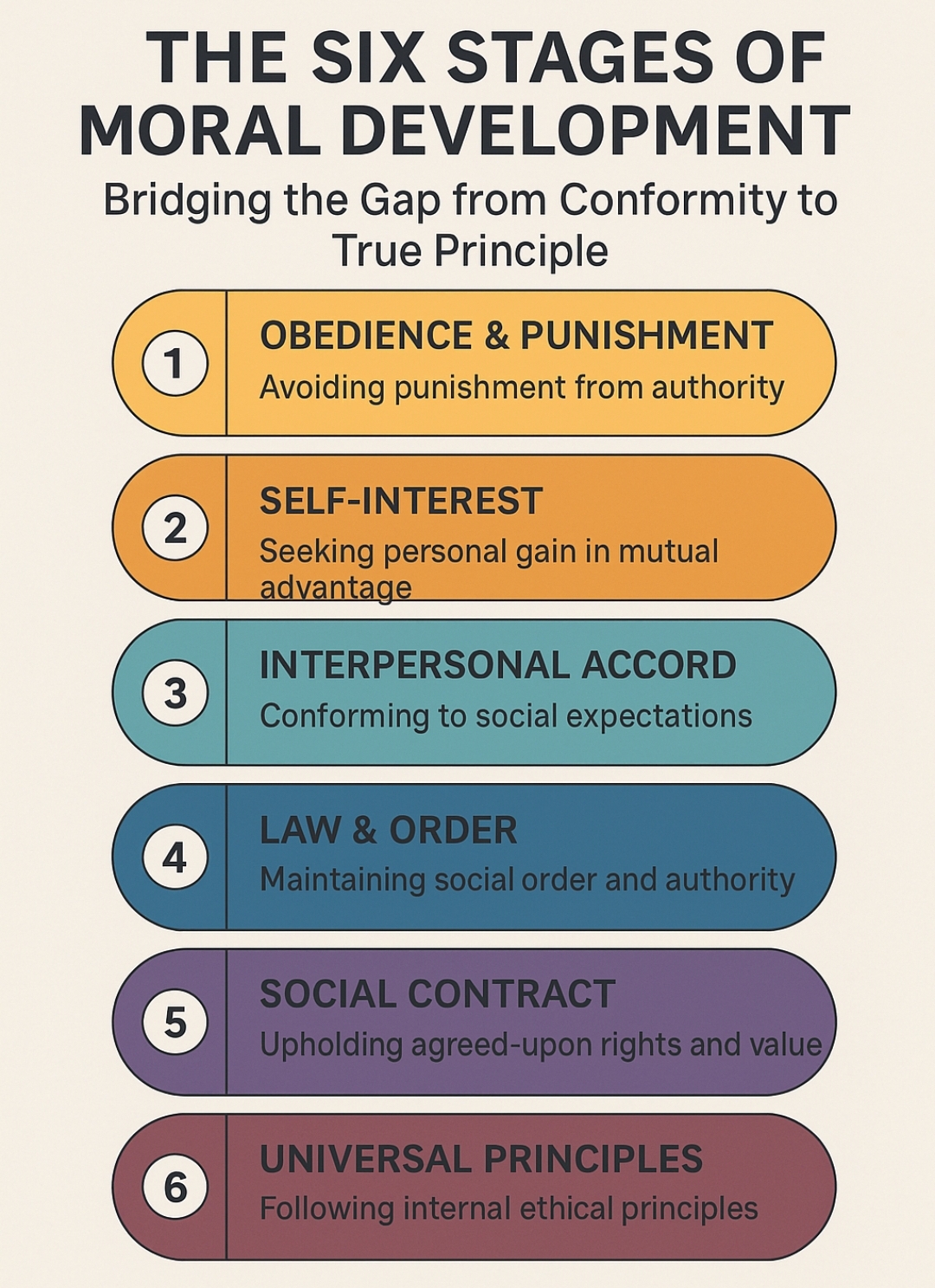Introduction: The path of moral development reflects the journey from externally imposed rules to the internalization of true principles. Lawrence Kohlberg famously mapped six stages of moral reasoning. When understood through historical and spiritual examples (such as Anne Frank, Herod, Daniel, and others), these stages show how humanity can fall into tyranny or rise into transcendent virtue. Understanding these stages also helps us recognize where we are individually and collectively—and how to bridge from societal conformity to moral freedom.
The Six Stages of Moral Development
Stage 1: Obedience and Punishment Orientation
- Motivation: Avoidance of punishment.
- Authority dictates what is “right.”
- Example: A child not lying merely to avoid being scolded.
Stage 2: Self-Interest Orientation
- Motivation: Reward and personal benefit.
- Right action is whatever serves one’s own needs.
- Example: “I’ll help you if you help me” mentality.
Stage 3: Interpersonal Accord and Conformity
- Motivation: Approval from others.
- Being “good” means pleasing others.
- Example: Laman and Lemuel in the Book of Mormon were loyal to societal norms rather than higher truth.
Stage 4: Authority and Social-Order Maintaining Orientation
- Motivation: Upholding law and order.
- Morality is tied to following rules, laws, and social structures.
- Example: Herod, fearing the loss of political power, killed innocent children to protect the established order (Matthew 2:16).
Stage 5: Social Contract Orientation
- Motivation: Rights and principles above written law.
- Laws are seen as flexible instruments for human purposes.
- Example: Founding Fathers drafting the U.S. Constitution, balancing law and human rights.
Stage 6: Universal Ethical Principles
- Motivation: Inner conscience and universal moral principles.
- Justice, dignity, and sanctity of life are upheld even against law.
- Example: Daniel refusing to stop praying despite King Darius’ decree (Daniel 6), or Anne Frank maintaining hope and dignity in the face of systemic evil.
How Historical Figures Reflect the Stages:
- Anne Frank: Lived at Stage 6 by holding on to hope, dignity, and the belief in goodness amid oppression.
- Herod: Remained trapped in Stage 4, enforcing authority and law to protect personal power.
- Daniel: Exemplified Stage 6, risking death to maintain fidelity to eternal principles rather than submit to unjust decrees.
How to Bridge from Stage 4 to Stage 6:
1. Awakening to Higher Principles:
- Study eternal truths (scripture, natural law, divine moral law).
- Question whether laws serve human dignity or suppress it.
2. Recognizing the Flaws of Man-Made Institutions:
- Understand that human structures are imperfect.
- Loyalty must be to truth, not merely institutions.
3. Personal Integrity over Social Approval:
- Develop courage to stand alone if necessary.
- Refuse to “go along to get along” when the crowd is wrong.
4. Moral Reflection and Self-Honesty:
- Regularly examine personal motives.
- Seek to align action with inner conscience, not external validation.
5. Strengthen Spiritual Anchoring:
- Prayer, meditation, and scripture reading build resilience.
- Spiritual grounding helps overcome fear of man.
6. Act on Convictions:
- Small acts of moral courage build strength for greater ones.
- Practice “civil disobedience” against unjust structures with wisdom and love.
Conclusion: True civilization and lasting freedom depend on individuals moving beyond blind conformity (Stage 4) into the moral maturity of living by universal principles (Stage 6). As Christ, Daniel, Anne Frank, and countless others have shown, it is better to risk the scorn of men and the structures they build than betray the higher law of love, justice, and truth.






